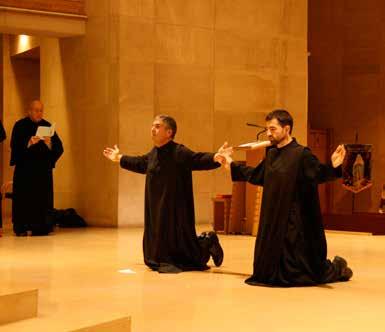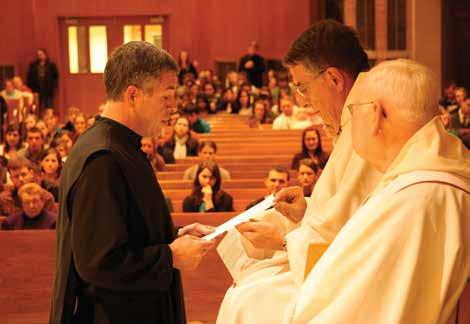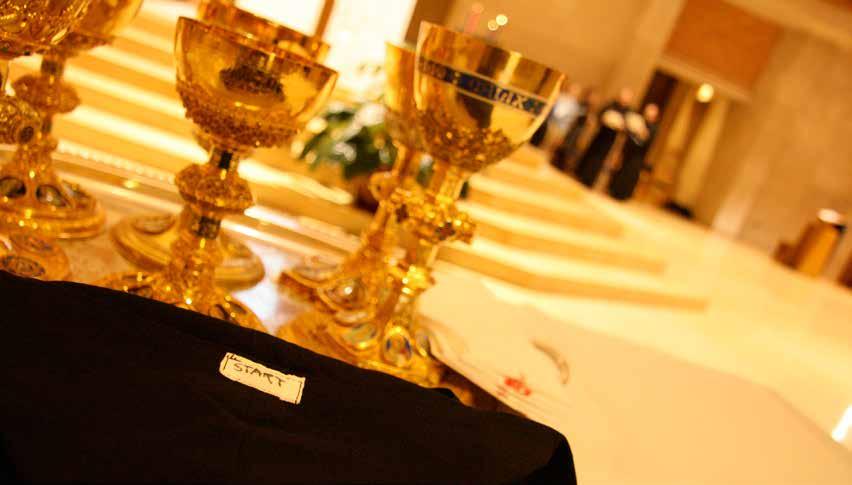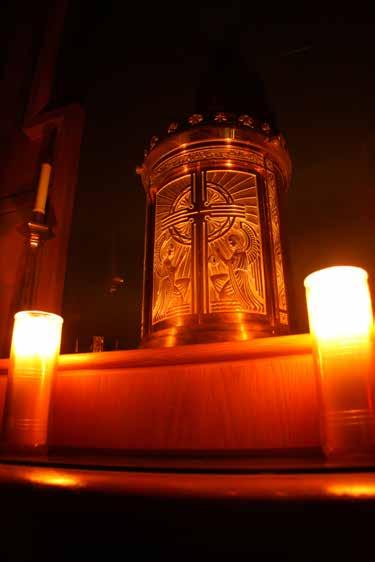
10 minute read
First ProFession
choing God’s words to Adam as he hid in the garden, Abbot Barnabas Senecal challenged St. Benedict’s Abbey’s two newest monks to answer the question “Where are you?” Brother Christopher Start and Brother Justin Dean did so by professing first vows Dec. 8, 2010. “Each of you in your own way and in your own time did hear the call of the Lord,” the Abbot noted, “to come to this place, not to hide, but to make visible your response to an inner sense that this is a place where you can pray and work to further the Kingdom of the Lord, within yourselves and within community.”
First vows, which follow a period of postulancy and a year of novitiate, last for at least three years before a monk can seek permission to profess final—permanent—vows.
“You know our schedule. You have rooms prepared outside the novitiate,” Abbot Barnabas said. “We have discussed the work or studies that you will undertake in the near future.”
He asked Brother Christopher and Father Justin to be active in the community so that no superior or fellow monks “will feel the need to ask ‘Where are you?’
“We want to know that you are among us, working as you did in the novitiate, at tasks both assigned and done as a volunteer,” he said, “keeping the place in good order, mindful of the presence and needs of the older monks, aware of the constant call to prayer and reflective reading.”
What they will do?
For Brother Christopher, home has always been in the Church. Monastic formation has been a “working out what I already knew in the abstract,” he says. He says he seeks to move from the novitiate to formation for final vows with trust and acceptance.
He is unwilling to speculate on what the next three years hold, but rather is trying to simply listen to what his new community and God expect of him.
A former teacher from Ann Arbor, Mich. with a master’s degree, Brother Christopher sought out St. Benedict’s Abbey when the balance between his prayer and work lives became a struggle. After several visits to the Abbey for retreats he “fell in love” with the community. He says he has walked his new path easily.
If anything is jarring, he says, it is the discord between what he is doing at age 27 and what many of his friends are doing.
“They are out starting families and careers,” he notes. There is a tension between “what I naturally want to do at this point in life and what God is asking me to give.
E
At their first profession a novice kneels before the altar and sings the Suscipe: Receive me Lord as you have promised and I shall live, do not disappoint me in my hope.
“There’s a lot of fighting with God.” Brother Christopher says he turns to what he calls the “heroic faith” of the older monks in the monastery for inspiration. “They are consistently giving and giving witness,” he says. “That is not easy, especially in a changing world. The monastery of the 1950s is radically different 60 years later. But that is the witness of monasticism: adjust to the times but stay true to yourself, stay true to the community.” Father Justin Dean is glad to get back to work. After 19 years as a priest in the Archdiocese of Mobile, Father Justin wanted something more – a more structured and simpler prayer life, a community to share it with. A year in the novitiate meant none of the pastoral work of a priest that he was accustomed to. “It was really a sabbatical,” he says. Following first vows he dove into the work of campus ministry at Benedictine College, and meeting with friends and benefactors in the Abbey Development Office. This summer he will participate in training for FOCUS missionaries on campus. As he embarks on the three years of first vows, he knows that balance, an attribute the Benedictines are known for, will be key. While the novitiate was an opportunity to study and experience monastic life, he says the added responsibilities that accompany first vows will allow him to gain a fuller understanding of monastic life. “This is the way I’m Father Justin kneels before the Abbot and reads his vows. Junior Master, Father Denis going to live for the rest
Meade, looks on. Over the next three years Father Denis will help prepare these newly continued on next page. professed monks for their solemn profession.


Above: The Novice Master, Father Bruce Swift, calls the novices forward to be accapted into the community. | Below: The novices will receive their hoods and copies of the Rule of St. Benedict from the Abbot. of my life if I stay here,” Father Justin says. “This formation is more conducive to the balance of monastic life and the apostolic life.”
Father Justin taught high school, worked in campus ministry and prison ministry, and, of course, served as a pastor, all apostolates of St. Benedict’s. However, in his search for a new home, it was the men of St. Benedict’s, more than the ministries, that drew him to Atchison.
“I felt a lot of camaraderie with the young guys here,” he said. “We were on the same page.”
He says he has found what he sought in the daily schedule of prayer and work, and even more in the bonds of community.
“I had priest friends and great parishioners and family where I was before,” he says. “But I like the sense of community, of praying together, eating together.”
It hasn’t been without its adjustments, he admits.
“I like the sense of community, of praying together, of eating together.” -Father Justin Dean
“There are the rubs of community life, of getting to know one another,” he says. “I’m reminded of the quote from Proverbs, ‘Iron sharpens iron, and one man sharpens another.’”
With that Proverb in mind, Father Justin seemed primed to answer Abbot Barnabas’s final question of his profession homily: “Where are you going?”
“You are going forward with a commitment to the vows of obedience, stability and conversion of life,” he said. “You know that obedience is to the Rule, the Abbot and the community. You know that stability in this place and in this way of life creates definition for you, creates identity and declares intent. You know that conversion of life – that seeking to make yourself in the image of Christ – is a life-long task of opening yourself to grace and to companionship in the best sense of that word.”
The Abbot expressed his hope that Brother Christopher and Father Justin find happiness and holiness in their new home, and that they accept the challenges of community life with humility and a desire for the common good.
Brother Christopher takes the Abbot’s words to heart.
“It takes a lot of trust,” he says. “A lot of the time I don’t necessarily know what’s going on, but God probably does.”

From The Desert
A Ground of all Reality
last year (Summer 2010) I wrote a column entitled, “Suffering is a Gift.” recently one of the Oblates of St. Benedict’s abbey commented on this column. an oblate is a lay person who lives the best he or she can according to the Holy rule of Saint Benedict. What makes this particular oblate unique is that he is an inmate in a Texas prison. What makes this oblate, whom I’ll call “Joe,” especially unique is that he has lived in solitary confinement for the past 11 years. Joe made a commitment years ago to walk away from his former gang life. Therefore, for his own protection in prison, he has to live in solitary confinement. Joe entered the Catholic Church in 2008. Since he lives in solitary confinement he cannot attend Mass. Instead, he receives communion once a month.
In our abbey’s Oblate Newsletter, Joe said that he had read my “Suffering is a Gift” article, and in subsequent letters that Joe and I have now started to exchange, he explained why he was so moved by a few words I had to say. Joe wrote to me, “Shortly before I read the article, I was reading a newspaper about a man who had committed a horrible crime against a small child and was to be executed that very night. I remember thinking, ‘This monster deserves to die.’” yet Joe went on to explain that after reading the following sentence in my article: “Jesus, I offer up my sufferings for the salvation of those for whom no one loves,” he was floored. Joe said, “It was like I got hit right between the eyes with a baseball bat. This was a man who needed my prayers. If I could not love this man, I could love no one and I would be lost. So since then I have been offering my suffering and prayers for whom no one loves. Jesus loves that man and so must I.” “Jesus loves that man and so must I.” Joe is a profound witness for the powerful love of Jesus Christ. and what a deep and profound spiritual insight Joe has gained while in prison, understanding that if he cannot love his neighbor, as Jesus would put it, then he is lost. Joe’s words, “Jesus loves that man and so must I,” are worth meditation. Joe also wrote to me, “Prison, and especially solitary, tends to breed anger, resentment and hatred.” He does his best to pray for those around him, and he has seen the power of prayer work—a fellow solitary confinement inmate, who used to live in the cell next to Joe, converted to Catholicism in December 2010. It all began because Joe started praying for him. Joe, with his witness of Catholic faith and his prayer life, is bringing the light of Jesus Christ into a world of darkness. and when Jesus the light of the World enters Father Gabriel Landis our lives, then anger, resentment and hatred recede. Pastor - St. Joseph’s Church I also reflect upon my homily for the 3rd Sunday in Ordinary Time. In our first reading from Isaiah we heard: “anguish has taken wing, dispelled is darkness: for there is no gloom where but now there was distress. The people who walked in darkness have seen a great light; upon those who dwelt in the land of gloom a light has shone. you have brought them abundant joy and great rejoicing.” I’ve also been reflecting on part of eucharist Prayer III, where the priest implores God the Father, “In mercy and love, unite all your children wherever they may be.” That is the current translation. The new Missal which will be released in advent of 2011, translates this phrase, “O merciful Father, gather to yourself all your children scattered throughout the earth.” I love this particular part of the eucharistic Prayer, because we all know people who are in some way, “scattered throughout the earth, in need of the merciful Father’s love.” We all know those in anguish; those who are walking in darkness; those who continue to live in gloom. We all know people who are not living in a physical prison, but in a prison of their own construction. We all know people who do not live in true solitary confinement, in a 5x9 cell, but due to whatever circumstances, their souls remain locked up and the light of the World has not been allowed in. Jesus Christ so desperately wants these children, so all the more we should daily pray, “O merciful Father, gather to yourself all your children scattered throughout the earth.” May we, like Joe, be the light of the World to those in need, for Candles burn around the clock at St. Joseph’s Church, signifying the those children scattered throughconstant light of Christ. In the darkest of places, even prison, the love of out the earth—especially for those Christ dispels the darkness of resentment, anger and hatred. for whom no one loves.
photo by J.D. Benning




